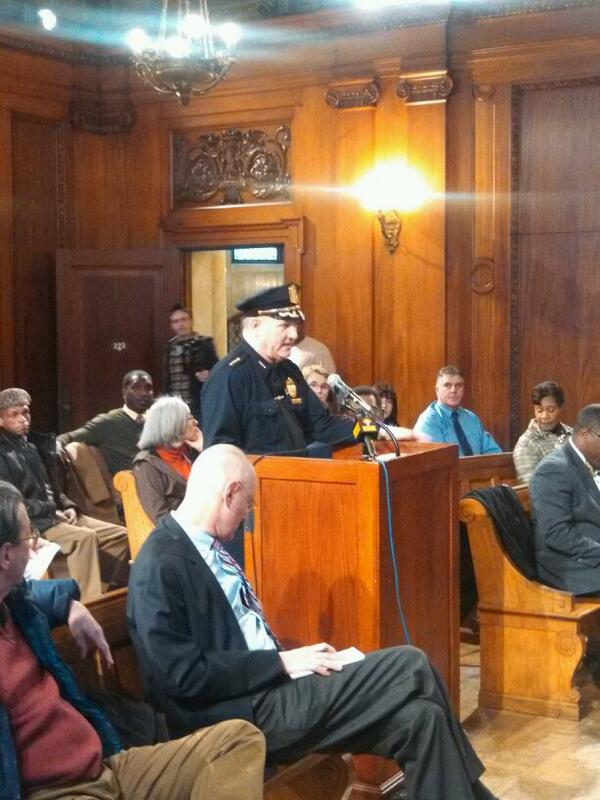Who Will Watch Springfield’s Watchmen?…
This post is the first in a series on the debate over Management of the Police Department in Springfield.

Police Commissioner William Fitchet addressing the City Council Public Safety Committee (WMassP&I)
SPRINGFIELD—At a rescheduled committee meeting residents pled their case for a return of the Police Commission while a few representatives from Mayor Domenic Sarno’s administration vehemently defended the status quo. However, by the end of the meeting it was not clear whether or not some kind of less confrontational approach was possible.
Since first reintroduced late last year, reinstituting the Police Commission has put the City Council on a collision course with Mayor Domenic Sarno. Commission supporters likely have a raw majority on the 13-member Council, but not the 2/3 needed to override a near-certain mayoral veto. At Thursday’s Committee hearing, most of those present supported the Commission’s return, or at least empowering a body other than Commissioner William Fitchet (or his successor) to discipline the department.Since the ordinance was proposed, Sarno announced he would replace Fitchet, due to retire in June, with one of the department’s three deputy chiefs. He planned to interview the three men—John Barbieri, William Cochrane and Robert McFarlin—in private and then make his choice public as early as March. Some community leaders, including many supporters of a revived commission, claim, albeit anonymously, that the selection of McFarlin has already been made.
At-large Councilor Tom Ashe, the committee’s chair, opened the meeting joined by the committee’s other two members, at-large Councilor Justin Hurst and Ward 7 Councilor Tim Allen. At-large Councilor Bud Williams, Ward 2 Councilor Mike Fenton (also the Council’s President), Ward 3 Councilor Melvin Edwards and Ward 8 Councilor Orlando Ramos were also in attendance. The hearing was moved from the cramped Council hearing room to the ornate chamber due to the size of the crowd.
From supporters of a commission there was a mix of bad experiences with the Police Department, dissatisfaction with the mayor’s Civilian Review Board, and anecdotes of the risk of concentrating power in one person. In reply, Sarno’s Chief of Staff Denise Jordan, Police Commissioner William Fitchet and to a lesser extent City Solicitor Ed Pikula said the review board was working and that the Commission would be a step back.
The proposed ordinance would revive the Police Commission essentially as it was before the Control Board abolished. It would have five members who discipline, hiring and promote officers while also developing regulating and organizing the department. The operational day-to-day head of the department would be the chief whose position would return to civil service.
Today, the department has a sole Police Commissioner who holds all of the powers the Commission held in addition to day-to-day duties, a point Fitchet alluded to when he said his was not a normal 40 hours a week gig. A Civilian Review Board erected under executive order of Sarno’s, holds hearings on complaints. Fitchet said he has always accepted the recommendations of the Board.
Speakers from the Springfield Council of Churches President Bishop Timothy Paul to 2013 Council candidate Ernesto Cruz urged that the Council had the power to revive the body and restore trust in the department. Cruz in particular noted that many politicians in the city do not hear from many residents who suffer from maltreatment from the police.
Yolanda Cancel, a city resident, activist and self-described ex-cop in Boston, said she had witnessed Police mistreatment of her own children. She attributed it to “hothead cops,” not unlike a few bad apples she knew in Boston. Another resident, who said her husband was a police officer in Northampton, said her children were, on occasion, in trouble, but when Springfield Police came to door, situations often escalated to the point where her husband had to ID himself as cop to calm things down.
Joseph Gentile, President of IPBO 364, related his and his members support for a reconstituted commission. While the support of Patrolmen’s Union for the commission has been widely known, Gentile’s remarks were perhaps among the first reported statements to the effect.
Gentile said the union opposed the Control Board’s abolition of the Commission. Walking a fine line between the fact that many complaints may involve his members and those members own reasons to support the commission, Gentile said everybody wanted to build trust in the community. Some issues are best left to police, he said, but discipline does not need to be one of them. “We are not afraid of having citizens look at the work we do,” Northeastern Public Radio reported him saying.

Denise Jordan (via Springfield City Website()
Jordan, Sarno’s Chief of staff and the person who is effectively its only staff, staunchly defended the institution against his critics, noting that attendance at the review board’s hearing is light compared to how relatively full the Council chamber was Thursday afternoon.
As Chief of Staff, she observed that the mayor’s office has not received complaints about the review board or citizen demands for a commission. Returning to her defense of the Board, she added it was “not fair to say” the board she heads was not working hard enough.
Julian Tynes, a former Chairman of the Massachusetts Commission Against Discrimination, disagreed with some calls for police commissioners to have qualifications, an omission in the proposed ordinance. Tynes noted that the School Committee has no such requirements. He also argued there was no specific trend in police management. Having working with police unions in Connecticut, Tynes said he saw a diversity of oversight systems, including one with a Town Council and Mayor making final decisions.
David Vigneault, a commission supporter and former State Representative from Springfield said there are vastly different experiences with the police among residents. Some people live in “very different worlds” from one side of the city versus the other. He added that disrupting a police culture was a good thing, alluding to his vote for the Quinn bill. Vigneault said the intent was to broaden the backgrounds of police beyond criminal justice.

Springfield City Solicitor Edward Pikula (via massmunilaw.org)
Solicitor Pikula also defended the system in brief remarks before the Committee saying the administration of the Police Department had been “evolving” for years now. That evolution included moving away from the Police Commission and toward the current system. He suggested that the Council instead codify the mayor’s executive order and create an advisory board binding on future mayors rather than subject to his or her caprice.
Responding to questions from Councilors, Pikula also discussed his legal opinion to the Council on the Police Commission. That opinion stated that the Council lacks the authority to recreate the Police Commission based on a novel theory, albeit one light on law or supporting court decisions.
WMassP&I obtained a copy of the opinion, which focuses heavily on the structure of the existing review board and spends precious little time on the Council’s authority. Indeed, Pikula focuses almost exclusively on the fact that were a Commission reinstituted, it and not the mayor would appoint the operational head of the police department, the chief. He argued that the city charter gives the mayor sole appointment authority.
“A return to the old Board of Police Commissioners would be contrary to these provisions of the City Charter in that the mayor would no longer appoint or remove the Department Head for the Police Department,” Pikula wrote. To square that with the prior existence of a commission, Pikula said past mayors effectively consented to an arrangement contrary to the charter. He cited no law or precedent to back his theory up. Pikula also did not mention that a reconstituted commission would be appointed by the mayor without Council approval, consistent with the charter.
Speaking before the committee, Pikula glossed over his opinion’s focus on only the appointment of the chief and more generally suggested the Council lacked authority to revive the Commission.

Councilor Bud Williams, a commission sponsor, was by turns conciliatory and confrontational with city officials. (WMassP&I)
Left unclear was whether Pikula’s remarks may have had the effect of undercutting the coalition backing the commission’s return. Both community groups and police officers support a new Commission, but for different reasons. Codifying the mayor’s executive ordinance may fall well short of community groups’ hopes, but would be in a direction those groups might favor. However, it could freeze out the IBPO’s desire for a forum to redress grievances with department not suited for the state labor boards.
Councilors were mostly quiet during the hearing, taking in speakers’ comments. Even Williams, known for his oratorical flourishes and extended monologues, was less talkative than usual. One noted exception was an exchange with Fitchet, which both appeared to be answering and questioning each other rhetorically rather than substantively.
That exchange did reveal, however, indirectly the failure of the existing review system to address complaints internal to the police department and among the rank and file. Fitchet, while insisting every external complaint eventually goes to the review board, demurred as to whether internal complaints had a similar path to resolution.
Edwards, Ward 3’s Councilor, a cosponsor of the revived commission, perhaps in response to Jordan’s claim of poor attendance at Review Board hearings, urged supporters to stay tuned in and make their voices heard.
A complicating factor left undiscussed, but clearly an elephant in the room was the speed at which the issue was being addressed, a reaction to Sarno’s timeline to replace Fitchet. Rather a slower construction of a new ordinance, the Council and commission supporters are seeking to change the ordinance before Sarno can ink a new contract with Fitchet’s successor and with it seal in all of the Commissioner’s current powers.
Use of the word of trust was thrown around a great deal as were promises that a bad vote would be remembered. Springfield resident Linda O’Connell, a former journalist, did not state an explicit position for or against a commission, but said she saw a mutual desire among all parties for trust and effectiveness. To Councilors she said, “When you make your decision, be clear why you are doing it,” so citizens know why.


